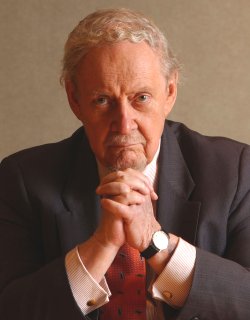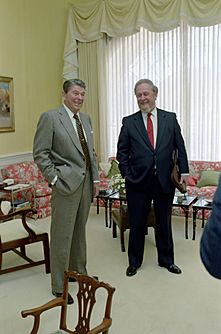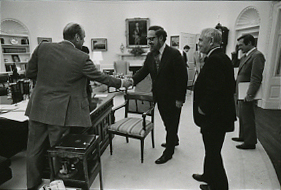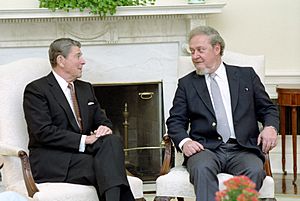Robert Bork facts for kids
Quick facts for kids
Robert Bork
|
|
|---|---|

Bork in 2005
|
|
| Judge of the United States Court of Appeals for the District of Columbia Circuit | |
| In office February 9, 1982 – February 5, 1988 |
|
| Appointed by | Ronald Reagan |
| Preceded by | Carl E. McGowan |
| Succeeded by | Clarence Thomas |
| United States Attorney General | |
| Acting October 20, 1973 – January 4, 1974 |
|
| President | Richard Nixon |
| Preceded by | Elliot Richardson |
| Succeeded by | William B. Saxbe |
| 35th Solicitor General of the United States | |
| In office March 21, 1973 – January 20, 1977 |
|
| President | |
| Preceded by | Erwin Griswold |
| Succeeded by | Wade H. McCree |
| Personal details | |
| Born |
Robert Heron Bork
March 1, 1927 Pittsburgh, Pennsylvania, U.S. |
| Died | December 19, 2012 (aged 85) Arlington, Virginia, U.S. |
| Resting place | Fairfax Memorial Park |
| Political party | Republican |
| Spouses |
|
| Children | 3 |
| Education | University of Chicago (AB, JD) |
| Military service | |
| Allegiance | |
| Branch/service | |
| Rank | |
| Battles/wars | Korean War |
Robert Heron Bork (March 1, 1927 – December 19, 2012) was an American lawyer and judge. He served as the top lawyer for the U.S. government, called the solicitor general of the United States, from 1973 to 1977. He was also a professor at Yale Law School. Later, he became a judge on the U.S. Court of Appeals for the D.C. Circuit.
In 1987, President Ronald Reagan chose Bork to be a judge on the U.S. Supreme Court. However, the Senate did not approve his nomination. This decision came after a very public hearing.
Contents
Early Life and Education
Robert Bork was born in Pittsburgh, Pennsylvania, on March 1, 1927. His father worked for a steel company. His mother was a schoolteacher. He was an only child.
Bork went to the Hotchkiss School in Connecticut. Then he attended the University of Chicago. He earned his first degree in 1948. He later studied law at the University of Chicago Law School. During his law studies, he took a break to serve in the U.S. Marine Corps. This was during the Korean War. He finished law school in 1953.
Academic Career and Legal Ideas
After serving in the military, Bork worked as a lawyer. In 1962, he became a professor at Yale Law School. He taught there until 1981. During this time, he took a break to work for the government.
At Yale, Bork became known for his book The Antitrust Paradox. In this book, he argued that large company mergers could sometimes help consumers. He believed that laws against monopolies should focus on what's best for consumers. His ideas greatly influenced how courts look at these laws today.
Bork also supported a legal idea called originalism. This means judges should interpret the United States Constitution based on what its writers originally meant. He believed judges should not make new laws from the bench.
Serving as Solicitor General
From 1973 to 1977, Bork served as the Solicitor General. This job involves representing the U.S. government in cases before the Supreme Court. He won several important cases during this time.
The "Saturday Night Massacre"
A famous event happened on October 20, 1973. It was called the "Saturday Night Massacre." President Richard Nixon wanted to fire Archibald Cox. Cox was a special prosecutor investigating the Watergate scandal. Nixon's top legal officials, Elliot Richardson and William Ruckelshaus, refused to fire Cox. They both resigned instead.
This made Robert Bork the Acting Attorney General. President Nixon then ordered Bork to fire Cox. Bork followed the order. He said he did it to prevent more chaos in the Justice Department. He stayed in the role until a new Attorney General was appointed.
Judge on the U.S. Court of Appeals
In 1982, President Ronald Reagan appointed Bork to be a judge. He served on the United States Court of Appeals for the District of Columbia Circuit. This is a very important court, often called the second-highest court in the U.S. He served there until 1988.
One of his notable opinions was in a case about privacy rights. Bork wrote that the Supreme Court had not clearly defined the right to privacy. He believed this made it hard for judges to apply it consistently.
Supreme Court Nomination

On July 1, 1987, President Reagan nominated Bork to the U.S. Supreme Court. This nomination caused a big debate in the United States Senate. Many groups, especially civil rights and women's rights organizations, opposed him. They were concerned about his views on privacy and civil rights decisions.
Bork was also criticized for his role in the "Saturday Night Massacre." Many senators worried he would give too much power to the President.
On October 23, 1987, the Senate voted against Bork's confirmation. The vote was 42 in favor and 58 against. This was a significant defeat for a Supreme Court nominee. The Supreme Court seat eventually went to Judge Anthony Kennedy. Kennedy was approved by the Senate with a unanimous vote. After this, Bork resigned from his judgeship in 1988.
"Bork" as a Verb
The word "bork" became a verb in American politics. It means to attack or criticize someone strongly, especially to stop them from getting a public job. The Oxford English Dictionary added the word in 2002. It defines "bork" as "To defame or vilify (a person) systematically... usually to prevent his or her appointment to public office."
Later Work and Views
After leaving the court, Bork taught law at George Mason University School of Law. He also worked as a fellow at the American Enterprise Institute. He continued to write books and share his legal ideas.
He wrote The Tempting of America, which discussed his legal philosophy. He also wrote Slouching Towards Gomorrah: Modern Liberalism and American Decline. In this book, he argued that modern society was losing its moral standards.
Bork was a strong supporter of originalism. He believed judges should stick to the original meaning of the Constitution. He argued that judges should not "legislate from the bench." This means they should not make laws themselves. His ideas influenced other judges, like Antonin Scalia and William Rehnquist.
In 2003, Robert Bork converted to Catholicism. He passed away on December 19, 2012, from heart disease. He was 85 years old.
Selected Writings
- Bork, Robert H. (1971). "Neutral Principles and Some First Amendment Problems". Indiana Law Journal 47 (1): 1–35. http://www.repository.law.indiana.edu/ilj/vol47/iss1/1.
- — (1978). The Antitrust Paradox. New York: Free Press. ISBN: 0-465-00369-9; 2nd edition (1993).
- — (1990). The Tempting of America. New York: Free Press. ISBN: 0-684-84337-4.
- — (1996). Slouching Towards Gomorrah: Modern Liberalism and American Decline. New York: ReganBooks. ISBN: 0-06-039163-4.
- — (2003). Coercing Virtue: The Worldwide Rule of Judges. Washington, DC: American Enterprise Institute Press. ISBN: 0-8447-4162-0.
- — (ed.) (2005). A Country I Do Not Recognize: The Legal Assault on American Values. Stanford: Hoover Institution Press. ISBN: 0-8179-4602-0.
- — (2008) A Time to Speak: Selected Writings and Arguments. Wilmington, DL: ISI Books. ISBN: 978-1-933859-68-2
- — (2013) Saving Justice: Watergate, the Saturday Night Massacre, and Other Adventures of a Solicitor General. New York: Encounter Books. ISBN: 978-1-59403-681-1
Images for kids
See also
 In Spanish: Robert Bork para niños
In Spanish: Robert Bork para niños
- Originalism
- Unsuccessful nominations to the Supreme Court of the United States
 | Tommie Smith |
 | Simone Manuel |
 | Shani Davis |
 | Simone Biles |
 | Alice Coachman |




